There are many causes given for the death of Civilisations, including environmental, moral, racial, economic, and dysgenic. However, those who reject political economy whether of the English Free Trade School or its Marxian and other socialist derivatives, give too little attention to the central role of materialism in the decline and fall of civilisations. Indeed, it can be contended that the latter is a primary cause of cultural etiolation, with other factors being symptoms of a prior culture-pathogen. For it is the way money is regarded as a culture-symbol that reflects the state of a Civilisation.
The towering genius of Western historical-philosophy, Oswald Spengler, detailed this culture-problem in his epochal Decline of the West nearly a century ago.[i]Even prior to Spengler however, the American Brooks Adams wrote a masterful study on the role of money in the decline of cultures in a no less remarkable book, The Law of Civilisation and Decay.[ii] For here, as with Spengler, we have the diagnostic method of culture-pathology and the possibilities of a cure once the cause is known.
It was for this reason that Ezra Pound, who was committed to overthrowing the money-power, enthusiastically recommended Brooks Adams’ book as essential reading.[iii]
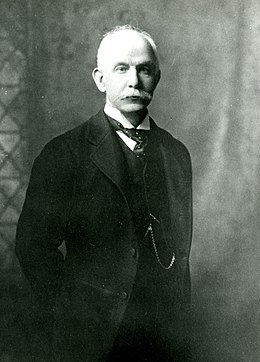 The Law of Civilization and Decay was published in 1896; that is, several decades prior to Spengler’s Decline of the West. Like Spengler, Adams traces through the analogous epochs of Civilizations the impact these epochs have upon the Culture in its entirety, from architecture to politics, focusing on the economic influences. He shows, like Spengler, that Civilizations proceed through organic cycles. Spengler used the names of seasons to illustrate the organic character of culture-life, going through the stages of birth (Spring; Culture), youthful vigor (Summer, High Culture), maturity (Autumn, Civilization), old age and senility (Winter), with an intervening era of revival – a dramatic final bow on the world stage – ending in death due to the primacy of money over spirit.
The Law of Civilization and Decay was published in 1896; that is, several decades prior to Spengler’s Decline of the West. Like Spengler, Adams traces through the analogous epochs of Civilizations the impact these epochs have upon the Culture in its entirety, from architecture to politics, focusing on the economic influences. He shows, like Spengler, that Civilizations proceed through organic cycles. Spengler used the names of seasons to illustrate the organic character of culture-life, going through the stages of birth (Spring; Culture), youthful vigor (Summer, High Culture), maturity (Autumn, Civilization), old age and senility (Winter), with an intervening era of revival – a dramatic final bow on the world stage – ending in death due to the primacy of money over spirit.
Adams first noted the ‘law of civilization and decay’ in the differences in architecture between the city-states in Civilizations that had maintained their cultural ethos, or what Spengler referred to as the culture-cities, and those that had been founded as centers of commerce. In the commercial cities such as Venice, Genoa, Pisa and Florence, of the early Western Medieval epoch, ‘the religious idea,’ expressed elsewhere in the Gothic style (which Spengler identified as one of the purest Western – Faustian – culture forms, epitomized by the Gothic Cathedral)[iv] was not defined. Adams wrote of this, like Spengler several decades later:
Furthermore, commerce from the outset seemed antagonistic to the imagination, for a universal decay of architecture set in throughout Europe after the great commercial expansion of the thirteenth century; and the inference I drew from these facts was that the economic instinct must have chosen some other medium by which to express itself.[v]
Adams concluded that a ‘mercantile community’ would instead express itself through its type of coinage. Another primary factor, Adams concluded, was that men act through impulse and instinct, and only rationalise their actions once they have attained their aims. Characteristics, states Adams, are inherited through familial generations, but as changes occur, and the inherited characteristics become redundant in new circumstances, families fall from fame to obscurity. ‘Particularly has this been true in revolutionary epochs such as the Reformation; and families so situated have very generally become extinct.’[vi]
There is a dichotomy that utilises a stored collective energy, either impelling great achievements or dissipating that energy. This is based on two drives: fear that prompts feelings of religion, imagination, the metaphysical and priesthood; and greed that ‘dissipates energy in war and trade.’[vii] These two primary drives as we might call them today, fear and greed, equate, I believe, with the Spring/Summer and Autumn/Winter epochs of Spengler’s morphology of cultures respectively.
‘Fear’ equates with a religious instinct. This should not be seen as having negative connotations, as Marx and other materialists, rationalists and atheists would insist. Rather, it is that primal quality of feeling of cosmic awe that Spengler saw in the Spring of a High Culture, where great art and great adventures are played out to a Culture’s ‘glory to God’ or Gods. That this religious instinct is transformed into a new pseudo-religious form in the Autumn and Winter epochs of a Civilisation can be seen from the use emerging economic classes – the bourgeois – made of Puritanism and Calvinism.[viii] Such forces were at the foundation of the USA.
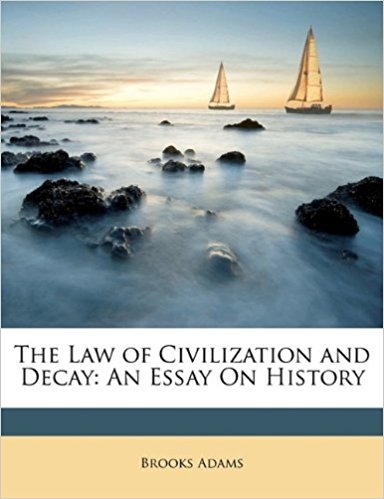 Adams’ theory of energy seems akin to C. G. Jung on the ‘canalisation’ of psychical energy (libido);[ix] with the two primary drives, fear and greed, in Adams’ theory, being the means by which what Jung called ‘canalisation’ manifests. In both Adams’ and Jung’s theories, instinct is at the base of this energy activation. Likewise with Spengler, instinct is at the base of the flowering of a High Culture in its Spring epoch, before ossifying into ‘reason’ in the Late or Winter epoch.
Adams’ theory of energy seems akin to C. G. Jung on the ‘canalisation’ of psychical energy (libido);[ix] with the two primary drives, fear and greed, in Adams’ theory, being the means by which what Jung called ‘canalisation’ manifests. In both Adams’ and Jung’s theories, instinct is at the base of this energy activation. Likewise with Spengler, instinct is at the base of the flowering of a High Culture in its Spring epoch, before ossifying into ‘reason’ in the Late or Winter epoch.
Like Spengler, Adams states that the formative stages of a High Culture, still based on ‘fear’, that is to say, the imaginative qualities, produce a culture that is ‘religious, military, artistic.’[x] Adams states that, ‘as consolidation advances, fear yields to greed, and the economic organism tends to supersede the emotional and martial.’[xi] Hence we arrive with Adams at the same place as Spengler, where money dominates at the late cultural epoch; and energy is expended on material gain at the expense of the founding spiritual ethos. Energy that is not expended is stored. Again we come to the theory similar to the libido of psychology. This surplus energy might be stored as wealth. Eventually conquest for booty or empire, still undertaken under the impress of the founding spiritual ethos, is displaced by the ‘greed’ impulse manifested as economics. Adams writes of this process:
However large may be the store of energy accumulated by conquest, a race must, sooner or later, reach the limit of its martial energy, when it must enter on the phase of economic competition. But, as the economic organism radically differs from the emotional and martial, the effect of economic competition has been, perhaps invariably, to dissipate the energy amassed by war.[xii]
The next passage by Adams is remarkably suggestive of Spengler in describing the cycles of decay:
When surplus energy has accumulated in such bulk as to preponderate over productive energy, it becomes the controlling social force. Thenceforward, capital is autocratic, and energy vents itself through those organisms best fitted to give expression to the power of capital. In this last stage of consolidation, the economic, and, perhaps, the scientific intellect is propagated, while the imagination fades, and the emotional, the martial, and the artistic types of manhood decay. When a social velocity has been attained at which the waste of energetic material is so great that the martial and imaginative stocks fail to reproduce themselves, intensifying competition appears to generate two extreme economic types, – the usurer in his most formidable aspect, and the peasant whose nervous system is best adapted to thrive on scanty nutriment. At length a point must be reached when pressure can go no further, and then, perhaps, one of two results may follow: A stationary period may supervene, which may last until ended by war, by exhaustion, or by both combined, as seems to have been the case with the Eastern Empire; or, as in the Western, disintegration may set in, the civilized population may perish, and a reversion may take place to a primitive form of organism.[xiii]
Here the primary elements of Spengler can be identified in Adams in terms of materialism giving rise to scientism or the ‘Age of Reason’ as it is called in the Western epoch, on the ruins of faith and an intuition of one’s place in the cosmos. The latter is replaced by a rootless struggle for economic existence or power, as approvingly observed by Marx in The Communist Manifesto. The intellectual replaces the priest, the banker replaces the aristocrat, and the proletarian replaces the craftsman and peasant. After the death of the Civilisation, the peasant reverts to his former existence outside of history, fellaheen as Spengler terms him in a post-civilisation, as in Egypt and India. Very close to the passage from Adams above, is the following from Spengler:
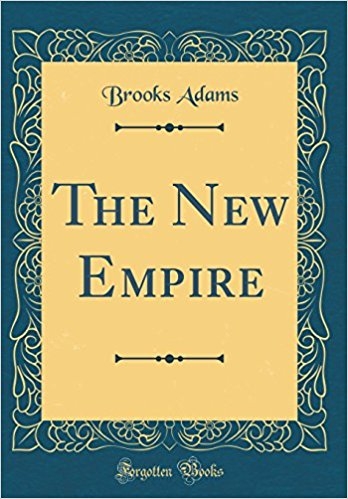 At this level, all Civilisations enter upon a stage, which lasts for centuries, of appalling depopulation. The whole pyramid of cultural man vanishes. It crumbles from the summit, first the world-cities, then the provincial forms, and finally the land itself, whose best blood has incontinently poured into the towns, merely to bolster them up awhile, at the last. Only the primitive blood remains, alive, but robbed of its strongest and most promising elements. This residue is the Fellah type.[xiv]
At this level, all Civilisations enter upon a stage, which lasts for centuries, of appalling depopulation. The whole pyramid of cultural man vanishes. It crumbles from the summit, first the world-cities, then the provincial forms, and finally the land itself, whose best blood has incontinently poured into the towns, merely to bolster them up awhile, at the last. Only the primitive blood remains, alive, but robbed of its strongest and most promising elements. This residue is the Fellah type.[xiv]
According to Adams, the law of civilisation and decay shows that energy is expended on economic competition to the point of culture exhaustion. The prolonged inertia that Adams refers to where the survivors of the dissipated old Civilisation exist devoid of vigour is analogous to the Fellah type described by Spengler. Both refer to the exhaustion of vigour expended for economic motives.
The evidence, however, seems to point to the conclusion that, when a highly centralized society disintegrates, under the pressure of economic competition, it is because the energy of the race has been exhausted. Consequently, the survivors of such a community lack the power necessary for renewed concentration, and must probably remain inert until supplied with fresh energetic material by the infusion of barbarian blood.[xv]
Where that fresh blood is to be found to reinvigorate a decaying West is problematic, given that culture-pathology has spread to every corner of the globe through international commerce, and is perhaps even exported as a world control mechanism to break down traditional barriers.[xvi] Spengler suggested, even in 1919, regardless of Bolshevism, that the fresh blood and new ethos might come eventually from Russia.[xvii]
As both Spengler and Adams state, the Late (Winter) epoch, i.e. the epoch in which we are now living, is based on Money and commerce, with the usurer, as Adams states, being the highest incarnation of Late Civilisation. The Late epoch makes literature, theatre, art and music, commodities like any automobile or refrigerator, as a quick turnover for profitability, and designed for quick obsolescence. Power is exercised through money, loans, international finance, and the power centres of the world are the money centres: New York and The City of London.
Money rules during the closing epoch of a Civilisation, until overthrown by an internal resurgence of authority and faith, or by invasion. Adams points out that decay soon set into Rome because the land-tiller-soldier was not equipped to deal with the rise of a mercantile elite, and the whole edifice became debt-ridden. The patrician class became money-lenders and shaped policy according to their interests. Debtors or their children often became slaves of the money-lenders. ‘The stronghold of usury lay in the fiscal system, which down to the fall of the Empire was an engine for working bankruptcy’. Although one thinks of Rome primarily as ruled by a stern martial ethos, Adams shows that at an early period ‘Romans had been bred destitute of the martial instinct’.
The Roman spiritual ethos was reasserted when the oligarchic families were overthrown by Pyrrhus, who saw Rome’s strength in her farmers. However, with Roman greatness and her imperial expansion came the conquest of populations that had already succumbed to decay, ‘and their cheap labour exterminated the husbandmen of Italy’, writes Adams. This passage from Adams cogently expresses the problem:
By conquest the countries inhabited by races of a low vitality and great tenacity of life were opened both for trade and slaving, and their cheap labour exterminated the husbandmen of Italy. Particularly after the annexation of Asia Minor this labour overran Sicily, and the cultivation of the cereals by the natives became impossible when the island had been parcelled out into great estates stocked by capitalists with eastern slaves who, at Rome, undersold all competitors. During the second century the precious metals poured into Latium in a flood, great fortunes were amassed and invested in land, and the Asiatic provinces of the Empire were swept of their men in order to make these investments pay. No data remain by which to estimate, even approximately, the size of this involuntary migration, but it must have reached enormous numbers, for sixty thousand captives were the common booty of a campaign, and after provinces were annexed they were depopulated by the publicans.[xviii]
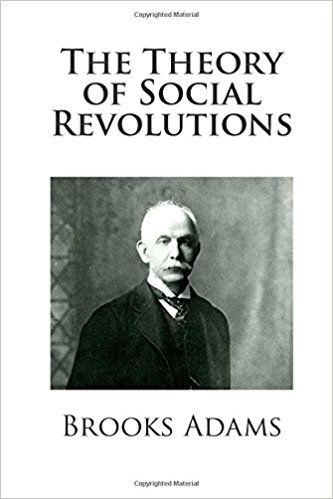 Where there were slaves imported from the subject peoples, long since etiolated, filling an Italy whose population was being denuded, there is today an analogous process in an analogous epoch: that of immigration from the ‘third world’ into the Western states whose populations are ageing. Oligarchy constituted the core of the Empire. Nobility became defined by wealth.
Where there were slaves imported from the subject peoples, long since etiolated, filling an Italy whose population was being denuded, there is today an analogous process in an analogous epoch: that of immigration from the ‘third world’ into the Western states whose populations are ageing. Oligarchy constituted the core of the Empire. Nobility became defined by wealth.
Just as Spengler notes how the cities suck the country and form a proletarianised mass, Adams relates that the same process took place in Italy. Free trade with Egypt caused the destitution and proletarianisation of the Italian farmers. Does this not seem very ‘modern’, very present-day?
By 22 AD Tiberius was trying to address the matter of how to return the Romans, who had become obsessed with opulence, to a simpler life. A trade imbalance in the pursuit of luxury items from the East brought Italy to ruin, with a financial crisis culminating in 33AD. Rome to maintain any military vigour, was obliged to recruit or press gang from its Germanic subject tribes. ‘This military metamorphosis indicated the extinction of the martial type, and it extended throughout society. Rome not only failed to breed the common soldier, she also failed to produce generals’. In a passage particularly reminiscent of Spengler, Brooks Adams provides what might be regarded as a summary of the condition of Roman Civilisation:
This supremacy of the economic instinct transformed all the relations of life, the domestic as well as the military. The family ceased to be a unit, the members of which cohered from the necessity of self-defence, and became a business association. Marriage took the form of a contract, dissoluble at the will of either party, and, as it was somewhat costly, it grew rare. As with the drain of their bullion to the East, which crushed their farmers, the Romans were conscious, as Augustus said, that sterility must finally deliver their city into the hand of the barbarians. They knew this and they strove to avert their fate, and there is little in history more impressive than the impotence of the ancient civilization in its conflict with nature. About the opening of the Christian era the State addressed itself to the task. Probably in the year 4 AD, the emperor succeeded in obtaining the first legislation favouring marriage, and this enactment not proving effective, it was supplemented by the famous Leges Julia and Papia Poppsea of the year 9. In the spring, at the games, the knights demanded the repeal of these laws, and then Augustus, having called them to the Forum, made them the well-known speech, whose violence now seems incredible. Those who were single were the worst of criminals, they were murderers, they were impious, they were destroyers of their race, they resembled brigands or wild beasts. He asked the equites if they expected men to start from the ground to replace them, as in the fable; and declared in bitterness that while the government liberated slaves for the sole purpose of keeping up the number of citizens, the children of the Marcii, of the Fabii, of the Valerii, and the Julii, let their names perish from the earth.[xix]
We come now to the present, when the pre-eminent world-city is New York as a symbol of the much-heralded ‘leader of the Western world,’ the USA. Here we see in the USA not the beginning of something new and vigorous, but the outgrowth of the most decayed elements of Western Civilisation: a dichotomy of Europe’s late Enlightenment Deism, and of English Puritanism. The latter sanctioned money-making as a divine commandment, and culture as a devilish waste of time.[xx] It is an ethic that worked against the development either of an American High Culture or America as the custodian of Western High Culture. For example, at the founding Puritan American Colonies, music was excluded as a profession[xxi], while Puritan functionalism worked against the development of a significant Puritan visual art.[xxii] While, as Adams states, the Reformation of Henry VIII paved the way for the dictatorship of money,[xxiii] the impetus was given by the English Puritan Revolution of 1642-1648. Adams stated of this that but for the hostility of The City, Charles the First would never have been vanquished, and that without the help of The City, Charles the Second could scarcely have been restored.[xxiv] The establishment of the Bank of England in 1688, facilitated with the usurpation of the Throne by William III of Orange signified the subordination of the Throne to the money-lender.
Hence, the dictature of money in the West was formalized in 1688 after several centuries of conflict between tradition and money. The world money centre shifted from London to New York in recent times in the same way that it had shifted from Amsterdam to London during the 17th Century. The reasons and consequences of these historical dynamics are perhaps no better explained to the Anglophone world than by Brooks Adams’ Law of Civilization and Decay.
Notes:
[i] Oswald Spengler, The Decline of the West (London: Allen and Unwin, 1971).
[ii] Brooks Adams, The Law of Civilisation and Decay (London: Macmillan Company, 1896), https://archive.org/stream/lawofcivilizatio00adam#page/n6/mode/1up
[iii] Ezra Pound, (1942) A Visiting Card (London: Peter Russell, 1952), 8-9.
Pound (1944) America, Roosevelt and the Causes of the Present War (London: Peter Russell 1951), 8, 13, 16.
Pound (1944) Gold & Work (London: Peter Russell 1951), 6.
[iv] Oswald Spengler, The Decline of The West, op. cit., Vol. I, 396: ‘The character of the Faustian cathedral is that of the forest… the architectural actualising of a world-feeling…’
[v] Brooks Adams, vi.
[vi] Ibid., vii.
[vii] Ibid., ix.
[viii] Max Weber, The Protestant Ethic and the Spirit of Capitalism (London: George Allen and Unwin, 1950).
[ix] Calvin S. Hall and Vernon J. Nordby, A Primer of Jungian Psychology (New York: New American Library, 1973), ‘Canalization of Energy’, 76-80.
[x] Brooks Adams, ix.
[xi] Ibid.
[xii] Ibid., x.
[xiii] Ibid., x-xi.
[xiv] Oswald Spengler, op. cit., Vol, II, p. 105.
[xv] Brooks Adams, xi.
[xvi] Ralph Peters, ‘Constant Conflict’, Parameters, US Army War College, Summer 1997, pp. 4-14, http://www.carlisle.army.mil/usawc/parameters/Articles/97summer/peters.htm
[xvii] Oswald Spengler, ‘The Two Faces of Russia and Germany’s Eastern Problems’, 14 February 1922, Politische Schriften, Munich, 1922.
[xviii] Brooks Adams, 12-13.
[xix] Brooks Adams, 42.
[xx] F. J. Bremer, The Puritan Experiment: New England Society from Bradford to Edwards (New York: St. Martins Press, 1976).
[xxi] R. Crawford, (ed.), America’s Musical Life: A History (New York: W. W. Norton, 2005).
[xxii] F. J. Bremer.
[xxiii] Brooks Adams, 233.
[xxiv] Brooks Adams, 292-293.



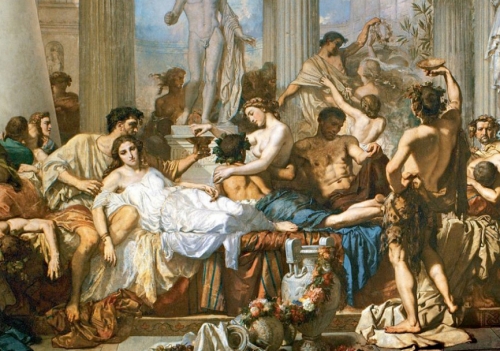

 del.icio.us
del.icio.us
 Digg
Digg
Les commentaires sont fermés.